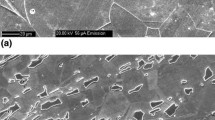Abstract
The stress corrosion cracking (SCC) behavior of sensitized AISI type 304 stainless steel (SS304) has been studied in dilute thiosulfate solutions as a function of thiosulfate concentrations and applied potentials. The susceptibility to SCC was observed to increase with thiosulfate concentrations and applied potentials. The addition of boric acid produced the reverse effect. A critical potential was found to exist, below which no SCC took place. Potential fluctuations, as recorded in the tests under open circuit conditions, appeared to be correlated with crack initiation and propagation during SCC. Current fluctuations observed in the controlled potential tests also gave indications of crack nucleation; however, at higher applied potentials such fluctuations were absent. The formation and presence of martensite in the specimens seemed to have a minor role in the overall SCC process. The aggressiveness of the thiosulfate concentration was also an important factor in determining the degree of susceptibility to SCC. The results obtained in the slow strain rate tests under open circuit as well as under potential-controlled conditions suggested a film ruptureanodic dissolution type of mechanism operative during SCC of sensitized SS304 in thiosulfate solutions.
Similar content being viewed by others
References
g. Cragnolino and D.D. Macdonald, Intergranular Stress Corrosion Cracking of Austenitic Stainless Steels at Temperatures Below 100 °C—A Review, Corrosion, Vol 38 (No. 8), 1982, p 406–424
H.S. Isaacs, BWR Water Chemistry Projects Review Meeting, EPRI, 13–14 May 1980 (Palo Alto, CA)
R.C. Newman, K. Sieradzki, and H.S. Isaacs, Stress-Corrosion Cracking of Sensitized Type 304 Stainless Steel in Thiosulphate Solutions, Metall. Trans., Vol 13A, 1982, p 2015–2026
R.C. Newman, R. Roberge, and R. Bandy, Environmental Variables in the Low Temperature Stress Corrosion Cracking of Inconel 600, Corrosion, Vol 39 (No. 10), 1983, p 386–390
H.S. Isaacs, Initiation of Stress Corrosion Cracking of Sensitized Type 304 Stainless Steel in Dilute Thiosulphate Solution, J. Electrochem. Soc., Vol 135 (No. 9), 1988, p 2180–2183
D.B. Wells, J. Stewart, R. Davidson, P.M. Scott, and D.E. Williams, The Mechanism of Intergranular Stress Corrosion Cracking of Sensitized Austenitic Stainless Steel in Dilute Thiosulphate Solution, Corros. Sci., Vol 33 (No. 1), 1992, p 39–71
R.C. Newman, K. Sieradzki, and J. Woodward, Corrosion Chemistry, Pits, Crevices and Cracks, A. Turnbull, Ed., HMSO, 1987, p 203
A. Kawashima, A.K. Agrawal, and R.W. Staehle, Stress Corrosion Cracking: The Slow Strain Rate Technique, STP 665, G.M. Ugiansky and J.H. Payer, Ed., ASTM, 1979, p 266–278
A.J.A. Mom, R.T. Dencher, C.J. v.d. Wekken, and W.A. Schultze, ibid., p 305–319
H.S. Isaacs, B. Vyas, and M.W. Kendig, The Stress Corrosion Cracking of Sensitized Stainless Steel in Thiosulfate Solutions, Corrosion, Vol 38 (No. 3), 1982, p 130–136
T. Narutani, Effect of Deformation-Induced Martensitic Transformation on the Plastic Behavior of Metastable Austenitic Stainless Steel, Mater. Trans., JIM, Vol 30 (No. 1), 1989, p 33–45
K. Elayaperumal, P.K. De, and J. Balachandra, Passivity of Type 304 Stainless Steel: Effect of Plastic Deformation, Corrosion, Vol 28 (No. 7), 1972, p 269–273
C. Hahin, R.M. Stoss, B.H. Nelson, and P.J. Reucroft, Effect of Cold Work on the Corrosion Resistance of Nonsensitised Austenitic Stainless Steels in Nitric Acid, Corrosion, Vol 32 (No. 6), 1976, p 229–238
G.B. Olsen and M.A. Cohen, A General Mechanism of Martensitic Nucleation: Part I General Concepts and the FCC-HCP Transformation, Metall. Trans., Vol 7A, 1976, p 1897–1904
G.R. Chanani, S.D. Antolovich, and W.W. Gerberich, Fatigue Crack Propagation in Trip Steel, Metall. Trans., Vol 3A, 1972, p 2661–2672
C. Bathias and R.M. Pelloux, Fatigue Crack Propagation in Martensitic and Austenitic Steels, Metall. Trans., Vol 4A, 1973, p 1265–1273
A.G. Pineau and R.M. Pelloux, Influence of Strain-Induced Martensite Transformations on Fatigue Crack Growth Rates in Stainless Steels, Metall. Trans., Vol 5A, 1974, p 1103–1112
G. Franke and C.J. Altstetter, Low Cycle Fatigue Behavior of Mn/N Stainless Steels, Metall. Trans., Vol 7A, 1976, p 1719–1727
Z. Khan and M. Ahmed, Stress-Induced Martensitic Transformation in Metastable Austenitic Stainless Steels: Effect of Fatigue Crack Growth Rate, J. Mater. Eng. Perf., Vol 5 (No. 2), 1996, p 201–208
Author information
Authors and Affiliations
Rights and permissions
About this article
Cite this article
Roychowdhury, S., Ghosal, S.K. & De, P.K. Role of environmental variables on the stress corrosion cracking of sensitized AISI type 304 stainless steel (SS304) in thiosulfate solutions. J. of Materi Eng and Perform 13, 575–582 (2004). https://doi.org/10.1361/10599490420584
Received:
Published:
Issue Date:
DOI: https://doi.org/10.1361/10599490420584




